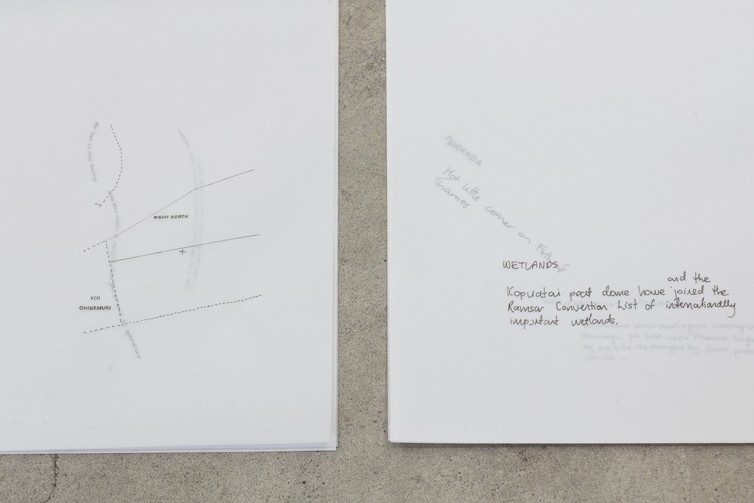Enjoy
Blog
Contents
All This Work Is Necessary Reading List
December 16 2023, by Brooke Pou
In All This Work Is Necessary, Ashleigh Taupaki presents a series of layered maps consisting of the archival text media and legislation that has negatively impacted the Hauraki wetlands. The reading list below is a small selection of resources that Taupaki has used throughout her studies.

Ashleigh Taupaki, Map Layers 1 - 200, 2022-23, pen on tracing paper, rocks from Hauraki waterways. Courtesy of Cheska Brown.
Albert Wendt, “Towards A New Oceania.” Mana Review: A South Pacific Journal Of Language And Literature, January, no. 1, 1976.
In his landmark essay “Towards A New Oceania” published in the inaugural issue of Mana, Albert Wendt cites scholars from across Te Moana Nui-a-Kiwa. Through voices from the past we can imagine a future for those living in the largest ocean in the world.
Ani Mikaere, He Rukuruku Whakaaro / Colonising Myths: Māori Realities. Auckland: Huia Press, 2011.
Ani Mikaere presents a series of papers that consider racism in the Pākehā legal system of this country. He Rukuruku Whakaaro / Colonising Myths: Māori Realities argues that as Crown Law is central to Māori oppression is it illogical to seek justice in the same law and we must instead reinstate tikanga in Māori legal practice.
Geoff Park and Craig Potton, Ngā Uruora = The Groves of Life: Ecology and History in a New Zealand Landscape, Wellington: Victoria University Press, 1995.
Linda Te Aho. “Te Mana O Te Wai: An Indigenous Perspective On Rivers And River Management.” River Res, vol 35, 2019, pp. 1615 - 1621.
In “Te Mana O Te Wai” Linda Te Aho recognises water as a taonga with its own mauri and espouses the importance of looking to Māori concepts and people when faced with the challenge of caring for our waterways.
Linda Tuhiwai Smith, Decolonizing Methodologies: Research and Indigenous Peoples. Third edition. London: Zed Books, 2021.
The influence of Decolonizing Methodologies is felt worldwide. Linda Tuhiwai Smith’s foundational text utilises case studies from Aotearoa and abroad to explore the intersections of colonialism and research, advocating for Indigenous research in academia.
Marama Muru-Lanning, Tupuna Awa: People and Politics of the Waikato River, Auckland: Auckland University Press, 2016.
In Tupuna Awa, Marama Muru-Lanning examines the relationship between the longest awa in Aotearoa and those who have ancestral links to it, while working through the complex politics surrounding debates over water ownership.
Mark P. Simpson et al, Hei Koha Tū, Hei Kura Huna a Papa : A Resource Characterisation and Ancestry of Minerals for Ngāti Hako, Wellington: GNS Science Te Pū Ao, 2019.
Paul Monin, This Is My Place : Hauraki Contested, 1769—1875. Wellington: Bridget Williams Books, 2001.
Ranginui Walker, Ka Whawhai Tonu Mātou / Struggle Without End. Rev. ed. Auckland: Penguin, 2004.
Ranginui Walker was a leading activist, academic and author whose book Ka Whawhai Tonu Mātou / Struggle Without End remains a best-seller. Here, he traces Māori history from arrival in Aotearoa through centuries of growth and upheaval from a distinctly Māori perspective. Ake ake ake!
Te Kawehau Hoskins, Critical Conversations in Kaupapa Māori, Auckland: Huia Publishers, 2017.
